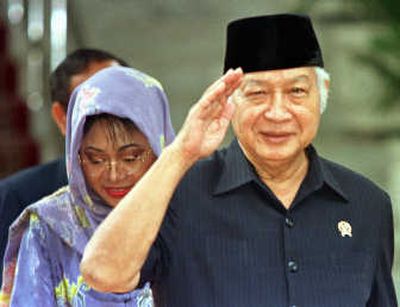Indonesia’s ex-dictator Suharto dies

JAKARTA, Indonesia – Former dictator Suharto, an army general who crushed Indonesia’s communist movement and pushed aside the country’s founding father to usher in 32 years of tough rule that saw up to a million political opponents killed, died today. He was 86.
Suharto had been in intensive care with lung, heart and kidney failure since he was admitted to the hospital on Jan. 4. Over the past week his physicians had spoken of a recovery, but by today that had changed dramatically.
Suharto, who led a regime widely regarded as one of the 20th century’s most brutal and corrupt, lived a reclusive life in a comfortable villa in downtown Jakarta for the past decade.
He had been in and out of the hospital several times for heart problems and internal bleeding since being toppled by a pro-democracy uprising during the 1997-1998 Asian financial crisis.
Historians say up to 800,000 alleged communist sympathizers were killed during Suharto’s rise to power from 1965 to 1968. His troops killed another 300,000 in military operations against independence movements in Papua, Aceh and East Timor.
Suharto’s poor health had kept him from facing trial, and no one has been punished for the killings.
Corruption watchdog Transparency International has said Suharto and his family amassed billions of dollars in stolen state funds, allegations the family is fighting in court.
Suharto’s successors as head of state vowed to end corruption that took root under Suharto, yet it remains endemic at all levels of Indonesian society.
With the court system paralyzed by corruption, the country has not confronted its bloody past. Rather than put on trial those accused of mass murder and multibillion-dollar theft, some members of the political elite consistently called for charges against Suharto to be dropped on humanitarian grounds.